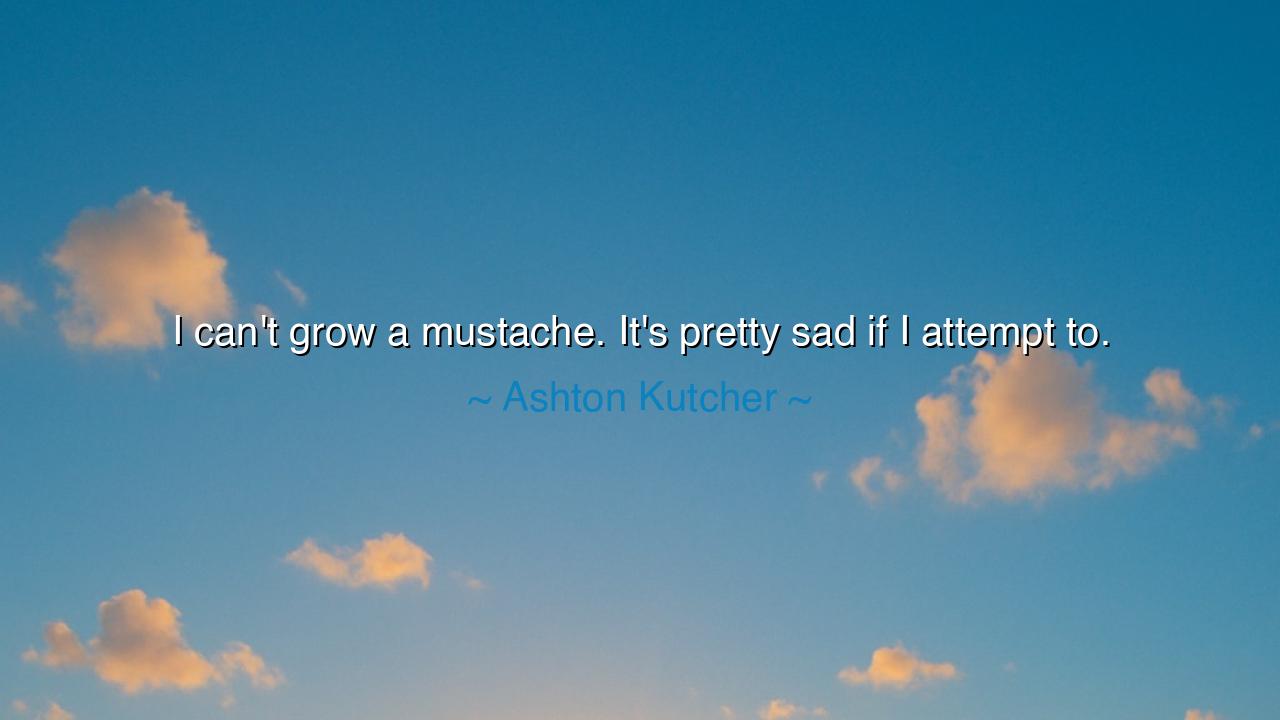
I can't grow a mustache. It's pretty sad if I attempt to.






Hear the words of Ashton Kutcher, spoken with jest yet holding within them a deeper truth: “I can’t grow a mustache. It’s pretty sad if I attempt to.” At first, one may laugh, for it seems a light confession of vanity, a passing remark about the face of a man. But pause, children of tomorrow, and look deeper, for even in humor lies wisdom. For what is a mustache but a symbol of image, of identity, of how one is perceived by the world? And what is the sadness of failing to grow it but the universal sorrow of falling short of an expectation, however small?
In the ancients’ eyes, the beard, the mustache, the adornments of the face were signs of maturity and strength. In Greece, the philosophers wore their beards as symbols of wisdom; in many lands, warriors let their facial hair grow to embody valor. Yet here, Kutcher confesses that this mark of manhood eludes him. His words remind us that even those who shine in fame and fortune are not free from imperfection. They too face limits, as all mortals do. His humility transforms laughter into recognition: that no one possesses all things, and that every soul carries its own lack.
Consider the tale of Alexander the Great, who, despite conquering empires, was said to have been mocked for his youthful appearance and lack of a heavy beard. Yet did this hinder him from changing the fate of nations? No. His greatness was not in his image but in his vision, not in his facial hair but in his fire. So too does Kutcher’s admission echo this timeless truth: that one’s worth is not measured in the ornaments of the flesh, but in the substance of the spirit.
The sadness he names is real, for humanity often attaches pride to appearance. We long to embody ideals that culture sets before us—whether it be the warrior’s beard, the scholar’s robes, or the artist’s charm. And when we cannot, we feel diminished. But in voicing this sadness openly, Kutcher performs an act of liberation. He teaches that one can laugh at their shortcomings, and in doing so, rob them of their power. Self-acceptance, even in jest, is a victory greater than any conquest.
From this we learn a great lesson: embrace your imperfections, for they too are part of your story. The one who hides his flaws becomes a prisoner of them; the one who names them, even with laughter, becomes free. Just as Kutcher admits, with gentle honesty, his lack, so must we learn to accept what we cannot change, and focus instead on what truly matters—our kindness, our creativity, our courage.
Practical actions stand before us: when you face an imperfection in yourself, do not conceal it with shame, but acknowledge it with grace. If possible, laugh at it; laughter is the shield that turns weakness into strength. When you see another struggle with something small or trivial, do not mock, but remind them that identity is not bound to appearances. Instead, cultivate what endures: wisdom, love, generosity, and vision.
Thus, let Kutcher’s light-hearted words be remembered as more than comedy. In saying, “I can’t grow a mustache,” he reminds us that the marks of manhood—or of identity in any form—are not dictated by surface alone. True greatness is not in the mustache, nor in the fleeting standards of beauty, but in the courage to accept oneself and to shine regardless. In this, even the smallest jest becomes an eternal teaching.






AAdministratorAdministrator
Welcome, honored guests. Please leave a comment, we will respond soon